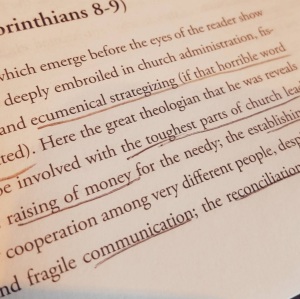You can’t see it here, but after I read this paragraph I wrote in the margin “anxious,” boldly underlined. Church, why do you require so much effort in areas that I’m not very good at? In Church Administration by Robert N. Bacher and Michael L. Cooper-White, we read how the burgeoning church, just decades after Jesus’ resurrection, responded to the call to follow Jesus by engaging in these administrative efforts:
- fiscal challenges
- ecumenical relations
- raising money
- establishing and managing volunteers
- creative communication (no cell towers or phones)
- reconciliation among congregations
- “[preserving] of the church as a Christian institution”
Oh boy. How is an ordained person, who often is one of two or less paid staff in the average ELCA congregation, supposed to do all that?
This is, of course, where I started. In a panic, thinking that I needed to gather all the information I could on a topic that I don’t have much strength in, so I can “do it all” and “be it all” to my future first congregation (God willing, I will be in a first call soon after internship). #superpastor (yes, I will reflect on my reflection).
If you know me at all, you know that I function from and believe in serving from a strengths-based place. God made and makes us all loved and worthy children of God who each have a unique set of experiences, stories, backgrounds, gifts and strengths (Luke 10:27). So why do we waste so much time fixing or filling the holes of places that we aren’t as good in, rather than asking for help and giving family, friends, congregants, or our fellow humans the opportunity to serve and lead from their strengths too?
I told my internship supervisor about this hidden assumption of mine. As I learn (and experience) my assumptions and questions on internship, we thought this was the best topic for my last class, a .5 online independent study with a hilarious, creative, and un-bounded vision caster for the church and the world, Dr. Terri Elton. So, I’m studying church administration. I will be walking through our main text, Church Administration, two chapters a week and interviewing church administrators along the way. I will post my weekly reflections here. I’m excited to book-learn and church-learn in my internship context, and I hope you also contribute in the comments on your contextual learning and questions. I have a feeling I’m not alone in my wondering about how to engage with administration while keeping myself from the temptation of doing it all myself.
Because here’s my starting point; my starting hunch (I know, hundreds of words later, but I’m getting there; you made it here, I’m proud of you!). Church administration is not something to visit or revisit only at times of crisis. It’s a red thread that is woven through every small group, every worship service, every quilters’ group, every late night council meeting, every community meal, and every staff and non-staff’s service experience.
You guys.
This is in everything. All the time.
And this isn’t something to panic about, like when you first learned about germs as a 1st grader; aahhhhh they’re everywhere! It’s something to reorient as a ministry alongside other ministries in a congregation. Bachor and Cooper-White explain that “administration” comes from the Latin ad + ministrare, meaning literally “one who ministers to.” To me, this means the ministries of a church are literally arranged and managed by those gifted in counting, governing, planning, and doing other administration-y things. These people are ministers.
“…[the] one whose work is primarily administrative is no less a faithful servant than those who mostly preach, teach or counsel…it is time for the church to reclaim the holiness of vocations that involve a major measure of administrative work” (vii).
This work, the behind-the-scenes of work of budgets, money, supervising, and schedules is holy work. This work is done by specific people in a congregation, but it’s also work that each leader does a little (or a lot) of in their role. In both ways, we’re reminded that all of our contributions are significant as we are each ministers, and part of the priesthood that God calls us to be (1st Peter 2:9).
You might be thinking, “Allison, but you went to school for and will make an awesome pastor-minister person! How can we all be ministers if you’re the minister?”
Good question. It’s both. A congregation has a minister or ministers (some have a synodically-authorized one if they’re tight on cash), and we’re all ministers. Those who are ordained in the ELCA administer communion and baptism and preach, and are in a separate space (or “office,” like the office of the president or the office of a superintendent) and get compensated. Those who aren’t ordained (or who aren’t on staff) don’t get paid by the congregation/synod/community. There are other distinctions between ordained ministers and all other ministers (everyone else, as we’re all called and children of God), but the point is that this concept is not black and white. If you’re reading this, looking back at your phone or laptop screen, we’re the same and we’re not. All at the same time.
As you can see by all my parentheses in that paragraph, I’m not satisfied with my own answer, because to say “it’s a both and!” or “it’s just another Lutheran paradox!” is I think a cop-out. Are we the same or are we different? What is it? Where is the peace and justice in knowing that one of us gets all the Starbucks gift cards for our faithful public ministry, and one of us just doesn’t? (it always comes back to coffee, doesn’t it). We’ll leave this topic for another day. I can feel Terri looking at my word count so let’s move on, at least for now. Priesthood of all believers and ministers (the theme of), I’m coming back for you!
What I wanted to land on as I reflect on these first two chapters of Church Administration is that when a group of motivated people gather to serve and discern God’s call, administration is a pair of glasses that they need to wear in order to carry out that service and discernment effectively. Bacher and Cooper-White write that administration and governance are enacted, “when two or more persons engage in a common purpose” (1).
When two brains, or two hearts, or two strengths connect and say:
- “Let’s try this new church thing.”
- “What if we try this church thing like this?”
- “I wonder what it would be like if we did church this way?”
…there is one purpose. There is a common purpose. Administration is a color in that new portrait of what the church looks like today. We could leave out that color, but we could be leaving out the color that ties all the rest of the colors together, or makes all the other colors work together. They just work.
I think Paul had this hunch about administration when he was first leading congregations who were sorting out what it meant to follow Jesus; a resurrected savior with an unpredictable, unbelievable story. How do you spread that message? How do you engage an entire community around a faith in Jesus that doesn’t peter out, but blazes a new path and direction in a world that is ripe with possibilities for new life, second chances, and new growth for all? That’s the urgency. That’s the call. So how does a congregation utilize the gift of administration as a red thread that helps us do our diverse ministry and work, and respond to God’s call most effectively?
That’s what I hope to learn more about in these six weeks with you. When was a time when you felt in over your head with administrative tasks (yes, “conflict” is a topic that will be explored in the weeks to come)? What pushed you to ask for help in administrative stuff, or what are you hoping to find help in, as an ordained, otherly-rostered or non-official pastor person, when it comes to administration?

















